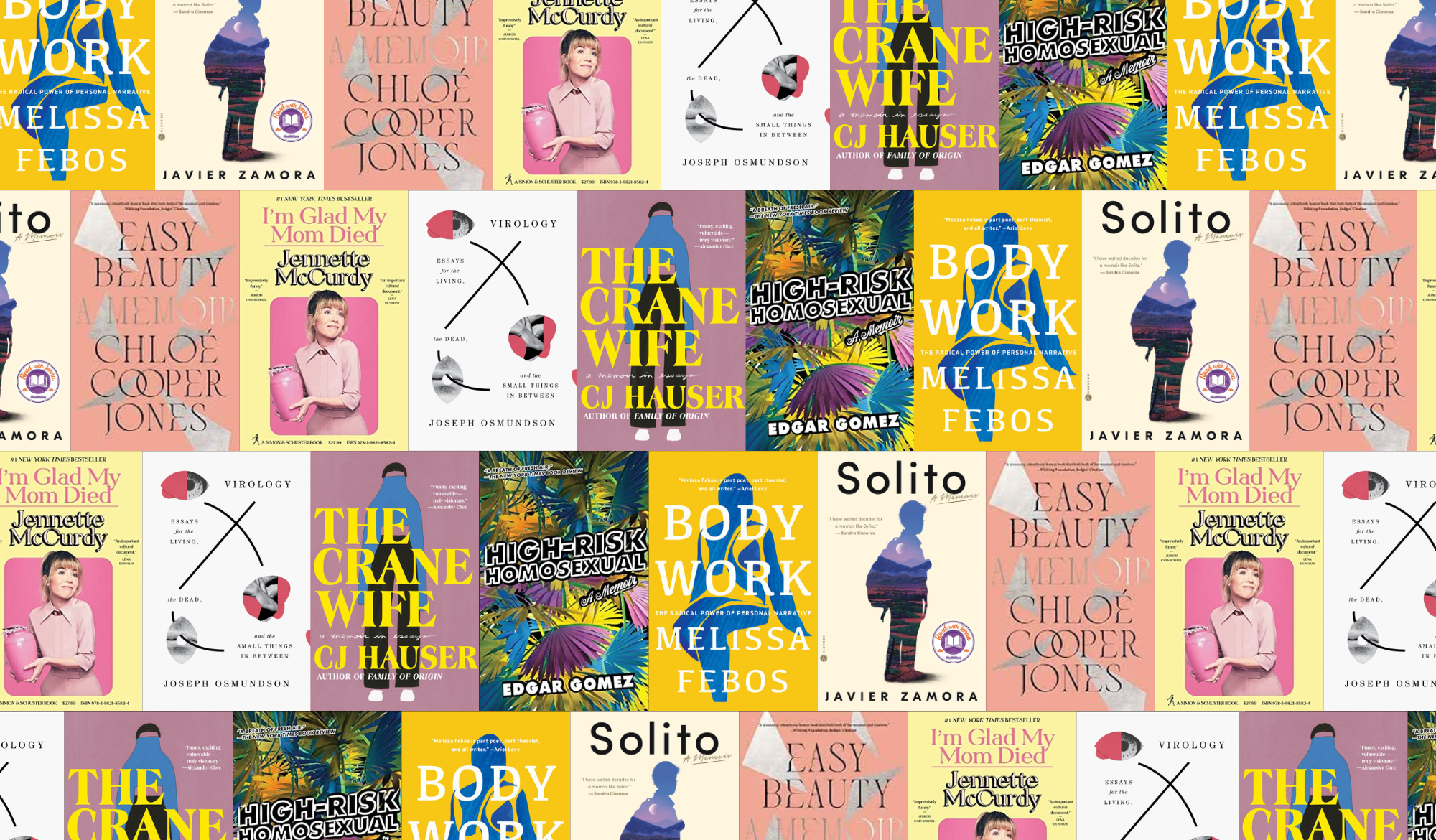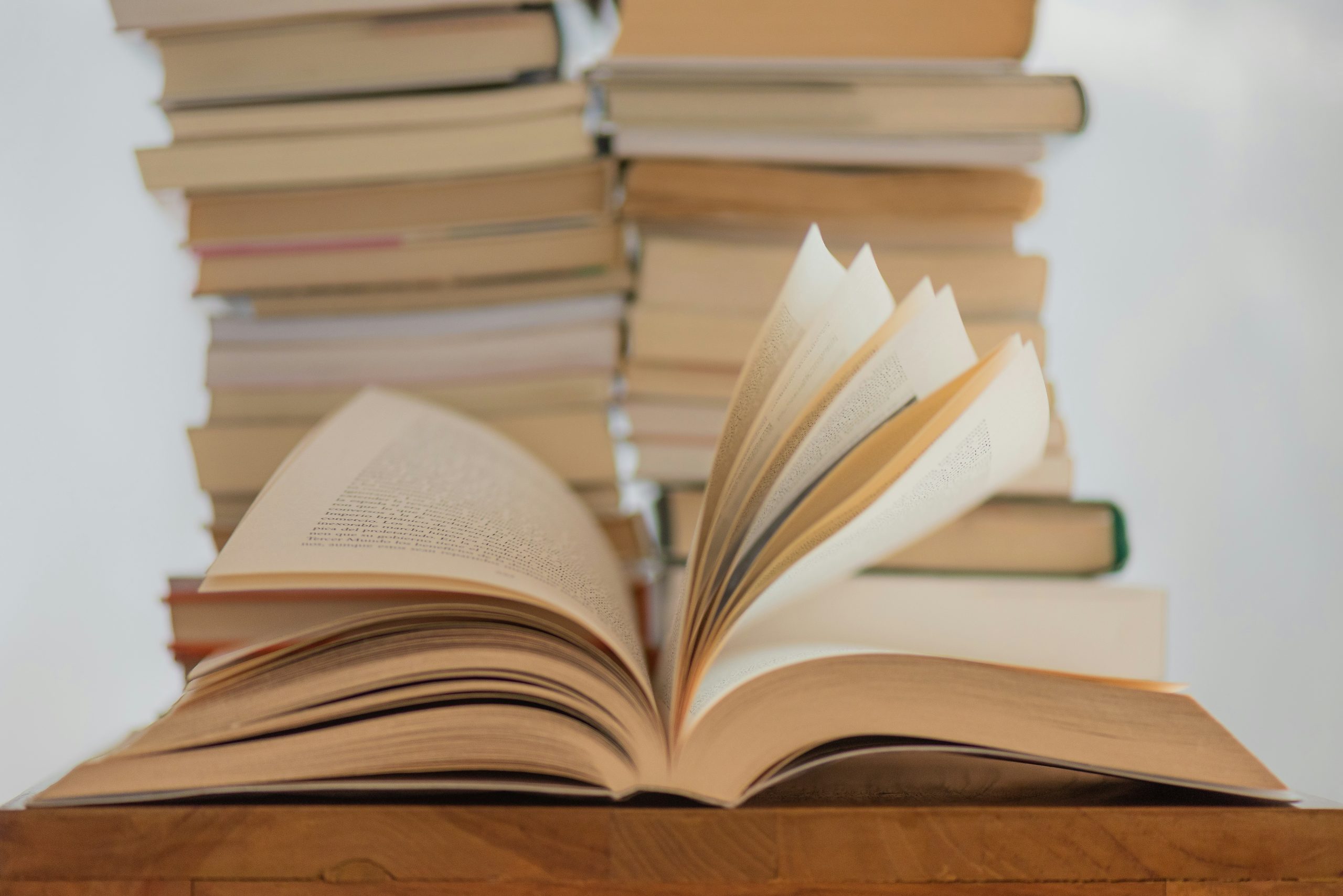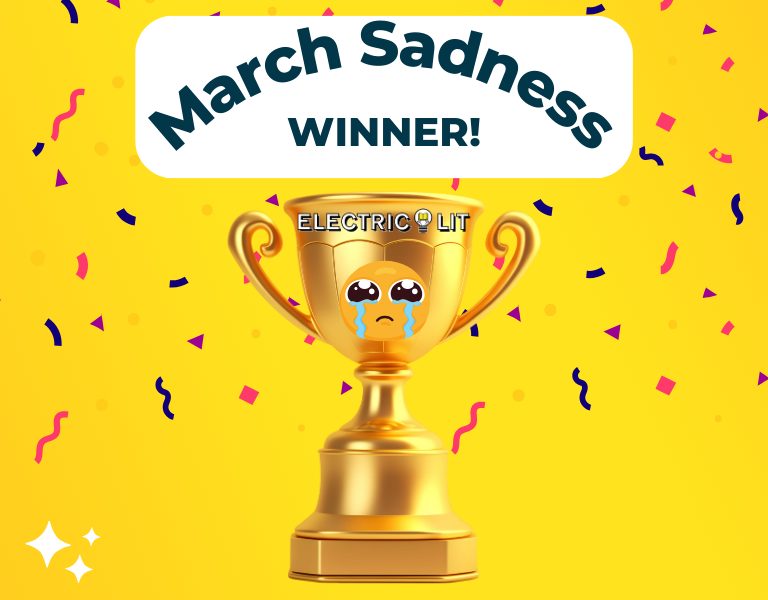Reading Lists
Electric Lit’s Favorite Nonfiction Books of 2022
Books by Melissa Febos, CJ Hauser, and Tajja Isen rank among our top picks in an outstanding year for nonfiction

Whether it’s urging fellow essayists to reject conventional writing wisdom or subverting the expected emotional responses to the death of a parent, much of 2022’s best nonfiction has been about reclaiming narratives: of the body, of the self, of religion and sex and popular culture. Exploring everything from the murky depths of the ocean floor to the oil fields of Alberta, this year’s creative nonfiction is at once achingly vulnerable and bitingly incisive, reflecting serious consideration of the systems that shape our daily lives and the individual choices we make within them. All these ideas and more are reflected in our list of the best nonfiction of 2022, voted on by Electric Literature staff and contributors. Here are the top three, followed by additional favorites (there were many ties!) in alphabetical order.
The Top Three Nonfiction Books of the Year
Body Work: The Radical Power of Personal Narrative by Melissa Febos
Appearing at the top of our nonfiction list for the second year in a row, Melissa Febos returns with Body Work, an invigorating blend of memoir and literary masterclass. “It’s often been taboo to talk about craft in terms of the personal,” Febos told Electric Literature earlier this year. “Our psychology, our wounds, our politics, and perhaps most of all, our bodies.” Pushing back against familiar craft advice to avoid “self-indulgence” and “navel-gazing,” Body Work celebrates the liberatory nature of autobiographical writing, calling for writers to reject the notion that their experiences aren’t worth committing to the page.
I’m Glad My Mom Died by Jeanette McCurdy
Known for starring in the teen sitcoms iCarly and Sam and Cat, former child star Jeanette McCurdy made headlines and topped bestseller lists this past summer with her memoir, I’m Glad My Mom Died. As unflinchingly honest and devastatingly funny as the intentionally provocative title and cover image of the book itself, McCurdy interrogates her relationship to addiction, eating disorders, and, of course, the controlling mother who thrust her into the limelight to begin with.
The Crane Wife by CJ Hauser
Published three years after the publication of her essay of the same name in The Paris Review, CJ Hauser’s 17-part memoir, The Crane Wife, unfurls an earnest, sharp-witted narrative about romantic, familiar, and interpersonal relationships—and the stories we tell ourselves about them once they’re over. “Seeking out binaries and black and white answers can make us feel resolved and settled and safe in an artificial way,” Hauser told Electric Literature. “What feels more empowering is feeling malleable and open and flexible, but knowing what you value so that you can make decisions that serve you over and over again.”
Electric Lit’s Other Favorite Nonfiction Books of the Year
Bad Sex: Truth, Pleasure, and an Unfinished Revolution by Nona Willis-Aronowitz
Written by Teen Vogue sex and love columnist Nona Willis-Aronowitz, Bad Sex explores, well, bad sex. Part memoir, part history, and part cultural criticism, Willis-Aronowitz traces the lineage of sexual inequities from the nineteenth century to the present, pairing a historical deep-dive into misogyny, feminism, and consent, with the author’s own journey toward sexual and romantic liberation amid the backdrop of patriarchy, capitalism, and white supremacy.
Best American Essays 2022 edited by Alexander Chee
“I found myself drawn to essays told with and through the information we take in through our bodies,” Alexander Chee writes in the forward to this year’s anthology of creative nonfiction, explaining his selection process. “If I wanted safety, it was the safety the truth provides.” Featuring work from Anthony Veasna So, Vauhini Vara, Elissa Washuta, and many, many more, this year’s anthology is an essential addition to the Best American canon.
Dirtbag, Massachusetts: A Confessional by Isaac Fitzgerald
Gritty, funny, and bittersweet, Isaac Fitzgerald’s memoir in essays, Dirtbag, Massachusetts, recounts the author’s journey through many different phases of his life: coming of age in a Boston homeless shelter, bartending in the bay area, and even smuggling medical supplies abroad. Noted on TIME’s Must-Read Books of the Year List, saints and dirtbags alike won’t want to miss this stunner.
Ducks: Two Years in the Oil Sands by Kate Beaton
In an attempt to pay off her student loan debt as quickly as possible, future New Yorker cartoonist Kate Beaton spent two years in Alberta working in the oil industry. Tacking labor, sexual violence, and the harm inflicted on the environment and on First Nations land, Beaton’s autobiographical comic, Ducks, tells a personal story of homesickness and loneliness while reflecting on the ethics of the oil industry.
Easy Beauty by Chloé Cooper Jones
Born with a rare congenital condition that manifests as a visible disability, formally trained philosopher and Pulitzer Prize winner Chloé Cooper Jones’ memoir, Easy Beauty, uses the author’s experience with disability as a launching point to explore the rules and limitations placed on us by society, the changes that accompany parenthood, and the role of beauty in our lives. “[The book] is interested in seeking out what beauty does in our lives and what the experience of beauty is,” Jones told Electric Literature. “How do we recognize it in our lives? What is that feeling that it gives?”
Girls Can Kiss Now by Jill Gutowitz
Featuring essays centered around her experiences with pop culture artifacts like Game of Thrones, Orange is the New Black, and Entourage, Jill Gutowitz’s essay collection, Girls Can Kiss Now, blends memoir with cultural analysis to explore the recent mainstreaming of lesbian culture. Sharp, funny, and timely, Girls Can Kiss Now offers a vulnerable, kaleidoscopic look at our pop culture past, present, and future.
Heretic by Jeanna Kadlec
In her memoir, Heretic, long-time Electric Lit contributor Jeanna Kadlec traces her experiences of leaving her husband, the evangelical church, and the life she had been born into in search of a more authentic lifestyle and community for herself as a queer woman. “My ideal readers, first and foremost, were younger versions of myself,” Kadlec says. “Ex-Evangelical queer people who were coming out of the church.”
High-Risk Homosexual by Edgar Gomez
In his sharp, intimate memoir, High-Risk Homosexual, Edgar Gomez traces his experiences coming out as a gay, Latinx man, exploring his complex relationship with his family from an uncle’s cockfighting ring in Nicaragua to the spaces where he would come to embrace his identity. “Part of the reason I wrote this book was to untangle the messiness of my upbringing and give meaning to the memories that haunt me,” Gomez wrote for Electric Literature. “I don’t believe writing is therapy, but spending hours attempting to understand why people did what they did…helped me reach a place of acceptance and forgiveness.”
How Far the Light Reaches: A Life in Ten Sea Creatures by Sabrina Imbler
The ocean is queer and wondrous in science writer Sabrina Imbler’s essay collection, How Far the Light Reaches, which, from shrimps to goldfish to yeti crabs, explores how sea creatures survive in a hostile environment. “I couldn’t help but draw these parallels in the book, using the ways that [sea creatures’] bodies have evolved to be perfectly suited for these foreign and alien environments, spaces that might not seem friendly to life,” Imbler told Electric Literature. “How do we manage to be resilient in the face of all these things that seek to destroy us?”
How to Read Now by Elaine Castillo
“I can no longer muster up disappointment when white authors whose works supposedly deal in equality and justice show themselves (and the reactionary readers who love them) to not be remotely interested in either equality or justice,” writes Elaine Castillo in How to Read Now. Pushing beyond familiar platitudes about reading’s capacity to build empathy, How to Read Now interrogates the ethics of consuming popular culture, urging us to reimagine the possibilities for what reading can be.
I Came All This Way to Meet You: Writing Myself Home by Jami Attenberg
Celebrated as a Best Book of the Year by TIME and The New Yorker, celebrated fiction writer Jami Attenberg’s memoir, I Came All This Way To Meet You, tells the story of how she came to devote her life to her art and her writing. From reflecting on the traumas of her youth to couch-surfing her way through a national book tour, Attenberg’s story is one of survival, artistic perseverance, and transformation. It represents, too, an essential addition to the travel writing genre, with Electric Literature author Alexa Abdalla calling it, “A guidebook, in more than one sense, for the resurgence of the genre.”
In Sensorium: Notes for My People by Tanaïs
Utilizing perfume as an organizing structure, writer and perfumer Tanaïs’ In Sensorium: Notes for My People combines the author’s experiences with perfume history, erotica, and religious texts to craft an expansive web of memory, senses, and ideas. “Becoming a part of a record is part of why I seek writing as my medium,” Tanaïs’ told Electric Literature. “A book is impermanent in many ways, but we write to create a body that lasts beyond our time. There’s comfort in knowing that a perfume is ephemeral.”
Manifesto: On Never Giving Up by Bernadine Evaristo
In her follow-up to her Booker Prize-winning novel, Girl, Woman, Other, Bernadine Evaristo returns with Manifesto: On Never Giving Up. Part memoir on her life and career and part manifesto on activism and creativity, Evaristo’s book will resonate with anyone who has felt counted out before they’ve even had a chance to begin.
Solito by Javier Zamora
In Javier Zamora’s gripping memoir, Solito, the author recounts his three-thousand-mile odyssey from El Salvador to the United States as a nine-year-old child. Communicating a journey marked by danger as well as by unexpected moments of grace and kindness, Solito is a powerful, intimate account of migration.
Some of My Best Friends: Essays on Lip Service by Tajja Isen
Across nine striking, highly-researched essays, Catapult editor-in-chief, voice actor, and debut author Tajja Isen’s Some of My Best Friends explores nationalism, colorblind casting, and the myth of neutrality to interrogate the gulf between what’s said—by individuals, organizations, and even corporations—and what’s meant. As Isen told Electric Literature shortly before the publication of the book: “It’s become easier than ever to say something while meaning, or intending to do, nothing.”
South to America: A Journey Below the Mason Dixon to Understand the Soul of a Nation by Imani Perry
“I don’t think that literature is organizing,” South to America author Imani Perry told Electric Literature early this summer, “but that literature can do the work of inspiring organizing.” The winner of the 2022 National Book Award for nonfiction, Perry’s book chronicles the Alabama-born author’s return to the South to chronicle the lives of Southerners—past and present—in an effort to better understand America.
The Invisible Kingdom: Reimagining Chronic Illness by Meghan O’Rourke
“We’ve created a culture in which we purposely isolate sick people,” says 2022 National Book Award finalist Meghan O’Rourke, discussing our culture of othering and isolating sick individuals. “We think of illness as a state apart from normal life, as opposed to being part of life.” O’Rourke’s memoir, The Invisible Kingdom, tackles the loneliness and isolation that comes with being sequestered in this manner, explicating her decades-long struggle with chronic pain, her navigation of the medical industry, and her search for answers.
The Man Who Could Move Clouds by Ingrid Rojas Contreras
“Ingrid Rojas Contreras has recreated what a memoir can be for everyone, but especially for the Latinx and Caribbean diasporas,” wrote Angela María Spring earlier this year for Electric Literature. Contreras fought for her memoir—a National Book Award Finalist—to be classified as nonfiction, tying her and her mother’s experiences with head trauma and amnesia to a years-later pilgrimage to Colombia following a dream visitation from her grandfather. The results are kaleidoscopic, breathtaking, and genre-defying.
The Tiger and the Cage: A Memoir of a Body in Crisis by Emma Bolden
After being diagnosed with endometriosis at a young age, the essay writer Emma Bolden found herself struggling for decades to convince doctors and medical professionals to believe and take seriously her account of her pain and symptoms. In her memoir, The Tiger and The Cage, Bolden shares a powerful, poetic narrative of her journey with her illness and her attempts to receive adequate medical support. “I’m not super uncomfortable about [my experience with endometriosis] being out there,” Bolden told Electric Literature. “I’m just like: This happened. It happened to me. It happens to other women.”
Virology: Essays for the Living, the Dead, and the Small Things in Between by Joseph Osmundson
“It’s not just public catastrophe, like the HIV or COVID-19 pandemic, that drives us to write,” says leading microbiologist Joseph Osmundson in Virology. “A private catastrophe, one just in our own body, can do the same.” Across 11 thought-provoking essays, Osmundson explores the personal and wide-ranging effects of viruses on our daily lives, interrogating how, in ways big and small, they impact our social graces, political discourse, legislation, and economic systems. As we continue to process and respond to the ongoing COVID-19 pandemic, Virology provides a timely call to action for a healthier tomorrow.
When They Tell You To Be Good by Prince Shakur
In his debut, coming-of-age memoir, Prince Shakur moves between the past and the present, bridging connections between his personal history as a gay Black man in the United States, with the history of his family, his murdered father, and of Black revolutionaries. “A memoir as a form allows you to dictate themes of a different level,” Shakur told Electric Lit earlier this year, regarding the scope of the book. “I think it gave me a deeper respect for what I could see as a kind of totality of my life thus far.”
You Don’t Know Us Negros and Other Essays by Zora Neale Hurston
One of Electric Literature’s most anticipated books of 2022, this compendium of Zora Neale Hurston’s essays, articles, and criticism spans thirty-five years of the beloved author’s work. Featuring an introduction by Henry Louis Gates Jr., this long-overdue collection represents the first comprehensive compendium of Hurston’s nonfiction output, showcasing her intelligence, style, and breadth as an archivist and thinker.









